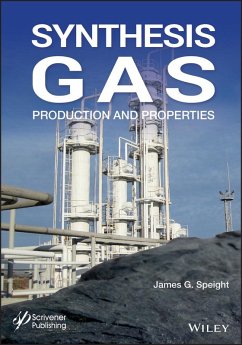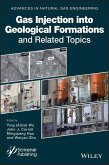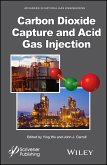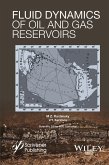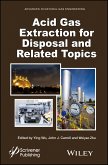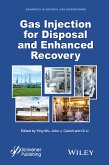

Alle Infos zum eBook verschenken

- Format: ePub
- Merkliste
- Auf die Merkliste
- Bewerten Bewerten
- Teilen
- Produkt teilen
- Produkterinnerung
- Produkterinnerung

Hier können Sie sich einloggen

Bitte loggen Sie sich zunächst in Ihr Kundenkonto ein oder registrieren Sie sich bei bücher.de, um das eBook-Abo tolino select nutzen zu können.
As a follow-up to the Handbook of Gasification Technology, also from Wiley-Scrivener, Synthesis Gas goes into more depth on how the products from this important technology can reduce our global carbon footprint and lead the United States, and other countries, toward energy independence. The environmental benefits are very high, and, along with carbon capture and renewable fuels, synthesis gas (or syngas) is a huge step toward environmental sustainability. Synthesis gas is one of the most important advancements that has ever occurred in energy production. Using this technology, for example,…mehr
- Geräte: eReader
- mit Kopierschutz
- eBook Hilfe
- Größe: 4.58MB
![Gas Injection into Geological Formations and Related Topics (eBook, ePUB) Gas Injection into Geological Formations and Related Topics (eBook, ePUB)]() Gas Injection into Geological Formations and Related Topics (eBook, ePUB)197,99 €
Gas Injection into Geological Formations and Related Topics (eBook, ePUB)197,99 €![Gas Hydrates 1 (eBook, ePUB) Gas Hydrates 1 (eBook, ePUB)]() Gas Hydrates 1 (eBook, ePUB)139,99 €
Gas Hydrates 1 (eBook, ePUB)139,99 €![Gas Hydrates 2 (eBook, ePUB) Gas Hydrates 2 (eBook, ePUB)]() Gas Hydrates 2 (eBook, ePUB)139,99 €
Gas Hydrates 2 (eBook, ePUB)139,99 €![Carbon Dioxide Capture and Acid Gas Injection (eBook, ePUB) Carbon Dioxide Capture and Acid Gas Injection (eBook, ePUB)]() Carbon Dioxide Capture and Acid Gas Injection (eBook, ePUB)197,99 €
Carbon Dioxide Capture and Acid Gas Injection (eBook, ePUB)197,99 €![Fluid Dynamics of Oil and Gas Reservoirs (eBook, ePUB) Fluid Dynamics of Oil and Gas Reservoirs (eBook, ePUB)]() M. Z. RachinskyFluid Dynamics of Oil and Gas Reservoirs (eBook, ePUB)225,99 €
M. Z. RachinskyFluid Dynamics of Oil and Gas Reservoirs (eBook, ePUB)225,99 €![Acid Gas Extraction for Disposal and Related Topics (eBook, ePUB) Acid Gas Extraction for Disposal and Related Topics (eBook, ePUB)]() Acid Gas Extraction for Disposal and Related Topics (eBook, ePUB)171,99 €
Acid Gas Extraction for Disposal and Related Topics (eBook, ePUB)171,99 €![Gas Injection for Disposal and Enhanced Recovery (eBook, ePUB) Gas Injection for Disposal and Enhanced Recovery (eBook, ePUB)]() Ying WuGas Injection for Disposal and Enhanced Recovery (eBook, ePUB)180,99 €
Ying WuGas Injection for Disposal and Enhanced Recovery (eBook, ePUB)180,99 €-
-
-
Dieser Download kann aus rechtlichen Gründen nur mit Rechnungsadresse in A, B, BG, CY, CZ, D, DK, EW, E, FIN, F, GR, HR, H, IRL, I, LT, L, LR, M, NL, PL, P, R, S, SLO, SK ausgeliefert werden.
- Produktdetails
- Verlag: John Wiley & Sons
- Seitenzahl: 512
- Erscheinungstermin: 20. Mai 2020
- Englisch
- ISBN-13: 9781119707899
- Artikelnr.: 59540724
- Verlag: John Wiley & Sons
- Seitenzahl: 512
- Erscheinungstermin: 20. Mai 2020
- Englisch
- ISBN-13: 9781119707899
- Artikelnr.: 59540724
- Herstellerkennzeichnung Die Herstellerinformationen sind derzeit nicht verfügbar.
Part 1: Production 1
1 Energy Sources and Energy Supply 3
1.1 Introduction 3
1.2 Typical Energy Sources 8
1.2.1 Natural Gas and Natural Gas Hydrates 9
1.2.2 The Crude Oil Family 10
1.2.3 Extra Heavy Crude Oil and Tar Sand Bitumen 12
1.3 Other Energy Sources 15
1.3.1 Coal 16
1.3.2 Oil Shale 19
1.3.3 Biomass 21
1.3.4 Solid Waste 25
1.4 Energy Supply 28
1.4.1 Economic Factors 28
1.4.2 Geopolitical Factors 29
1.4.3 Physical Factors 29
1.4.4 Technological Factors 30
1.5 Energy Independence 31
References 36
2 Production of Synthesis Gas 41
2.1 Introduction 41
2.2 Synthesis Gas Generation 44
2.3 Feedstocks 46
2.3.1 Natural Gas 46
2.3.2 Crude Oil Resid, Heavy Crude Oil, Extra Heavy Crude Oil, and Tar Sand
Bitumen 47
2.3.3 Refinery Coke 50
2.3.4 Coal 50
2.3.5 Biomass 52
2.3.6 Solid Waste 56
2.3.7 Black Liquor 59
2.3.8 Mixed Feedstocks 61
2.3.8.1 Biomass and Coal 62
2.3.8.2 Biomass and Municipal Solid Waste 62
2.4 Influence of Feedstock Quality 63
2.5 Gasification Processes 65
2.5.1 Feedstock Pretreatment 66
2.5.2 Feedstock Devolatilization 67
2.5.3 Char Gasification 68
2.5.4 General Chemistry 68
2.5.5 Stage-by-Stage Chemistry 72
2.5.5.1 Primary Gasification 72
2.5.5.2 Secondary Gasification 74
2.5.5.3 Water Gas Shift Reaction 76
2.5.5.4 Carbon Dioxide Gasification 77
2.5.5.5 Hydrogasification 78
2.5.5.6 Methanation 79
2.5.5.7 Catalytic Gasification 80
2.5.6 Physical Effects 80
2.6 Products 82
2.6.1 Gaseous Products 83
2.6.1.1 Low Btu Gas 84
2.6.1.2 Medium Btu Gas 85
2.6.1.3 High Btu Gas 86
2.6.1.4 Synthesis Gas 86
2.6.2 Liquid Products 87
2.6.3 Tar 88
References 89
3 Gasifier Types and Gasification Chemistry 95
3.1 Introduction 95
3.2 Gasifier Types 96
3.2.1 Fixed-Bed Gasifier 102
3.2.2 Fluid-Bed Gasifier 105
3.2.3 Entrained-Bed Gasifier 108
3.2.4 Molten Salt Gasifier 109
3.2.5 Plasma Gasifier 111
3.2.6 Other Types 113
3.2.7 Gasifier Selection 113
3.3 General Chemistry 115
3.3.1 Devolatilization 118
3.3.2 Products 118
3.4 Process Options 119
3.4.1 Effects of Process Parameters 120
3.4.2 Effect of Heat Release 121
3.4.3 Other Effects 121
References 122
4 Gasification of Coal 125
4.1 Introduction 125
4.2 Coal Types and Properties 128
4.3 Gas Products 130
4.3.1 Coal Devolatilization 131
4.3.2 Char Gasification 131
4.3.3 Gasification Chemistry 132
4.3.4 Other Process Options 133
4.3.4.1 Hydrogasification 133
4.3.4.2 Catalytic Gasification 134
4.3.4.3 Plasma Gasification 134
4.3.5 Process Optimization 135
4.4 Product Quality 136
4.4.1 Low Btu Gas 136
4.4.2 Medium Btu Gas 138
4.4.3 High Btu Gas 138
4.4.4 Methane 139
4.4.5 Hydrogen 139
4.4.6 Other Gases 140
4.5 Chemicals Production 140
4.5.1 Coal Tar Chemicals 140
4.5.2 Fischer-Tropsch Chemicals 143
4.5.2.1 Fischer-Tropsch Catalysts 143
4.5.2.2 Product Distribution 144
4.6 Advantages and Limitations 145
References 145
5 Gasification of Heavy Feedstocks 149
5.1 Introduction 149
5.2 Heavy Feedstocks 152
5.2.1 Crude Oil Residua 153
5.2.2 Heavy Crude Oil 155
5.2.3 Extra Heavy Crude Oil 155
5.2.4 Tar Sand Bitumen 155
5.2.5 Other Feedstocks 156
5.2.5.1 Crude Oil Coke 157
5.2.5.2 Solvent Deasphalter Bottoms 158
5.3 Synthesis Gas Production 159
5.3.1 Partial Oxidation Technology 160
5.3.1.1 Shell Gasification Process 162
5.3.1.2 Texaco Process 162
5.3.1.3 Phillips Process 163
5.3.2 Catalytic Partial Oxidation 163
5.4 Products 164
5.4.1 Gas Purification and Quality 165
5.4.2 Process Optimization 166
5.5 Advantages and Limitations 166
5.5.1 Other Uses of Residua 167
5.5.2 Gasification in the Future Refinery 167
References 169
6 Gasification of Biomass 173
6.1 Introduction 173
6.2 Gasification Chemistry 177
6.2.1 General Aspects 178
6.2.2 Reactions 181
6.2.2.1 Water Gas Shift Reaction 184
6.2.2.2 Carbon Dioxide Gasification 185
6.2.2.3 Hydrogasification 186
6.2.2.4 Methanation 186
6.3 Gasification Processes 187
6.3.1 Gasifiers 188
6.3.2 Fischer-Tropsch Synthesis 192
6.3.3 Feedstocks 193
6.3.3.1 Biomass 193
6.3.3.2 Gasification of Biomass with Coal 194
6.3.3.3 Gasification of Biomass with Other Feedstocks 198
6.4 Gas Production and Products 199
6.4.1 Gas Production 199
6.4.2 Gaseous Products 201
6.4.2.1 Synthesis Gas 201
6.4.2.2 Low-Btu Gas 203
6.4.2.3 Medium-Btu Gas 203
6.4.2.4 High-Btu Gas 204
6.4.3 Liquid Products 205
6.4.4 Solid Products 205
6.5 The Future 206
References 210
7 Gasification of Waste 217
7.1 Introduction 217
7.2 Waste Types 219
7.2.1 Solid Waste 220
7.2.2 Municipal Solid Waste 221
7.2.3 Industrial Solid Waste 221
7.2.4 Bio-Solids 222
7.2.5 Biomedical Waste 223
7.2.6 Sewage Sludge 223
7.3 Feedstock Properties 224
7.4 Fuel Production 224
7.4.1 Preprocessing 225
7.4.2 Process Design 227
7.5 Process Products 228
7.5.1 Synthesis Gas 228
7.5.2 Carbon Dioxide 228
7.5.3 Tar 229
7.5.4 Particulate Matter 231
7.5.5 Halogens/Acid Gases 231
7.5.6 Heavy Metals 232
7.5.7 Alkalis 233
7.5.8 Slag 233
7.6 Advantages and Limitations 234
References 235
8 Reforming Processes 239
8.1 Introduction 239
8.2 Processes Requiring Hydrogen 242
8.2.1 Hydrotreating 243
8.2.2 Hydrocracking 244
8.3 Feedstocks 245
8.4 Process Chemistry 246
8.5 Commercial Processes 248
8.5.1 Autothermal Reforming 249
8.5.2 Combined Reforming 249
8.5.3 Dry Reforming 250
8.5.4 Steam-Methane Reforming 251
8.5.5 Steam-Naphtha Reforming 253
8.6 Catalysts 254
8.6.1 Reforming Catalysts 254
8.6.2 Shift Conversion Catalysts 256
8.6.3 Methanation Catalysts 256
8.7 Hydrogen Purification 257
8.7.1 Wet Scrubbing 257
8.7.2 Pressure-Swing Adsorption Units 257
8.7.3 Membrane Systems 258
8.7.4 Cryogenic Separation 258
8.8 Hydrogen Management 259
References 260
9 Gas Conditioning and Cleaning 263
9.1 Introduction 263
9.2 Gas Streams 265
9.3 Synthesis Gas Cleaning 270
9.3.1 Composition 270
9.3.2 Process Types 272
9.4 Water Removal 274
9.4.1 Absorption 275
9.4.2 Adsorption 276
9.4.3 Cryogenics 278
9.5 Acid Gas Removal 278
9.5.1 Adsorption 279
9.5.2 Absorption 280
9.5.3 Chemisorption 281
9.5.4 Other Processes 285
9.6 Removal of Condensable Hydrocarbons 289
9.6.1 Extraction 291
9.6.2 Absorption 292
9.6.3 Fractionation 292
9.6.4 Enrichment 293
9.7 Tar Removal 294
9.7.1 Physical Methods 294
9.7.2 Thermal Methods 296
9.8 Other Contaminant Removal 296
9.8.1 Nitrogen Removal 296
9.8.2 Ammonia Removal 298
9.8.3 Particulate Matter Removal 298
9.8.4 Siloxane Removal 298
9.8.5 Alkali Metal Salt Removal 299
9.8.6 Biological Methods 299
9.8.6.1 Biofiltration 300
9.8.6.2 Bioscrubbing 302
9.8.6.3 Bio-Oxidation 303
9.9 Tail Gas Cleaning 303
9.9.1 Claus Process 304
9.9.2 SCOT Process 305
References 306
Part 2: Fuels and Chemicals from Synthesis Gas 311
10 The Fischer-Tropsch Process 313
10.1 Introduction 313
10.2 History and Development of the Process 317
10.3 Synthesis Gas 320
10.4 Production of Synthesis Gas 323
10.4.1 Feedstocks 323
10.4.2 Product Distribution 326
10.5 Process Parameters 327
10.6 Reactors and Catalysts 330
10.6.1 Reactors 330
10.6.2 Catalysts 332
10.7 Products and Product Quality 336
10.7.1 Products 336
10.7.2 Product Quality 337
10.8 Fischer-Tropsch Chemistry 339
10.8.1 Chemical Principles 340
10.8.2 Refining Fischer-Tropsch Products 344
References 346
11 Synthesis Gas in the Refinery 349
11.1 Introduction 349
11.2 Processes and Feedstocks 350
11.2.1 Gasification of Residua 353
11.2.2 Gasification of Residua with Coal 354
11.2.3 Gasification of Residua with Biomass 354
11.2.4 Gasification of Residua with Waste 356
11.3 Synthetic Fuel Production 358
11.3.1 Fischer-Tropsch Synthesis 359
11.3.2 Fischer-Tropsch Liquids 360
11.3.3 Upgrading Fischer-Tropsch Liquids 362
11.3.3.1 Gasoline Production 363
11.3.3.2 Diesel Production 365
11.4 Sabatier-Senderens Process 366
11.4.1 Methanol Production 367
11.4.2 Dimethyl Ether Production 368
11.5 The Future 369
References 373
12 Hydrogen Production 377
12.1 Introduction 377
12.2 Processes 381
12.2.1 Feedstocks 382
12.2.2 Commercial Processes 383
12.2.2.1 Hydrocarbon Gasification 384
12.2.2.2 Hypro Process 385
12.2.2.3 Hydrogen from Pyrolysis Processes 386
12.2.2.4 Hydrogen from Refinery Gas 387
12.2.2.5 Other Options 387
12.2.3 Process Chemistry 388
12.3 Hydrogen Purification 390
12.3.1 Wet Scrubbing 391
12.3.2 Pressure-Swing Adsorption 391
12.3.3 Membrane Systems 392
12.3.4 Cryogenic Separation 393
12.4 Hydrogen Management 394
References 395
13 Chemicals from Synthesis Gas 399
13.1 Introduction 399
13.2 Historical Aspects and Overview 410
13.3 The Petrochemical Industry 412
13.4 Petrochemicals 417
13.4.1 Primary Petrochemicals 417
13.4.2 Products and End Use 418
13.4.3 Production of Petrochemicals 419
13.4.4 Gaseous Fuels and Chemicals 425
13.4.4.1 Ammonia 425
13.4.4.2 Hydrogen 427
13.4.4.3 Synthetic Natural Gas 427
13.4.5 Liquid Fuels and Chemicals 428
13.4.5.1 Fischer-Tropsch Liquids 428
13.4.5.2 Methanol 428
13.4.5.3 Dimethyl Ether 429
13.4.5.4 Methanol-to-Gasoline and Olefins 429
13.4.5.5 Other Processes 429
13.5 The Future 430
References 437
14 Technology Integration 439
14.1 Introduction 439
14.2 Applications and Products 440
14.2.1 Chemicals and Fertilizers 441
14.2.2 Substitute Natural Gas 441
14.2.3 Hydrogen for Crude Oil Refining 442
14.2.4 Transportation Fuels 443
14.2.5 Transportation Fuels from Tar Sand Bitumen 445
14.2.6 Power Generation 445
14.2.7 Waste-to-Energy Gasification 446
14.2.8 Biomass Gasification 447
14.3 Environmental Benefits 449
14.3.1 Carbon Dioxide 450
14.3.2 Air Emissions 450
14.3.3 Solids Generation 450
14.3.4 Water Use 450
14.4 A Process for Now and the Future 451
14.4.1 The Process 451
14.4.2 Refinery of the Future 453
14.4.3 Economic Aspects 454
14.4.4 Market Outlook 455
14.5 Conclusions 455
References 457
Coversion Factors 459
Glossary 463
About the Author 489
Index 491
Part 1: Production 1
1 Energy Sources and Energy Supply 3
1.1 Introduction 3
1.2 Typical Energy Sources 8
1.2.1 Natural Gas and Natural Gas Hydrates 9
1.2.2 The Crude Oil Family 10
1.2.3 Extra Heavy Crude Oil and Tar Sand Bitumen 12
1.3 Other Energy Sources 15
1.3.1 Coal 16
1.3.2 Oil Shale 19
1.3.3 Biomass 21
1.3.4 Solid Waste 25
1.4 Energy Supply 28
1.4.1 Economic Factors 28
1.4.2 Geopolitical Factors 29
1.4.3 Physical Factors 29
1.4.4 Technological Factors 30
1.5 Energy Independence 31
References 36
2 Production of Synthesis Gas 41
2.1 Introduction 41
2.2 Synthesis Gas Generation 44
2.3 Feedstocks 46
2.3.1 Natural Gas 46
2.3.2 Crude Oil Resid, Heavy Crude Oil, Extra Heavy Crude Oil, and Tar Sand
Bitumen 47
2.3.3 Refinery Coke 50
2.3.4 Coal 50
2.3.5 Biomass 52
2.3.6 Solid Waste 56
2.3.7 Black Liquor 59
2.3.8 Mixed Feedstocks 61
2.3.8.1 Biomass and Coal 62
2.3.8.2 Biomass and Municipal Solid Waste 62
2.4 Influence of Feedstock Quality 63
2.5 Gasification Processes 65
2.5.1 Feedstock Pretreatment 66
2.5.2 Feedstock Devolatilization 67
2.5.3 Char Gasification 68
2.5.4 General Chemistry 68
2.5.5 Stage-by-Stage Chemistry 72
2.5.5.1 Primary Gasification 72
2.5.5.2 Secondary Gasification 74
2.5.5.3 Water Gas Shift Reaction 76
2.5.5.4 Carbon Dioxide Gasification 77
2.5.5.5 Hydrogasification 78
2.5.5.6 Methanation 79
2.5.5.7 Catalytic Gasification 80
2.5.6 Physical Effects 80
2.6 Products 82
2.6.1 Gaseous Products 83
2.6.1.1 Low Btu Gas 84
2.6.1.2 Medium Btu Gas 85
2.6.1.3 High Btu Gas 86
2.6.1.4 Synthesis Gas 86
2.6.2 Liquid Products 87
2.6.3 Tar 88
References 89
3 Gasifier Types and Gasification Chemistry 95
3.1 Introduction 95
3.2 Gasifier Types 96
3.2.1 Fixed-Bed Gasifier 102
3.2.2 Fluid-Bed Gasifier 105
3.2.3 Entrained-Bed Gasifier 108
3.2.4 Molten Salt Gasifier 109
3.2.5 Plasma Gasifier 111
3.2.6 Other Types 113
3.2.7 Gasifier Selection 113
3.3 General Chemistry 115
3.3.1 Devolatilization 118
3.3.2 Products 118
3.4 Process Options 119
3.4.1 Effects of Process Parameters 120
3.4.2 Effect of Heat Release 121
3.4.3 Other Effects 121
References 122
4 Gasification of Coal 125
4.1 Introduction 125
4.2 Coal Types and Properties 128
4.3 Gas Products 130
4.3.1 Coal Devolatilization 131
4.3.2 Char Gasification 131
4.3.3 Gasification Chemistry 132
4.3.4 Other Process Options 133
4.3.4.1 Hydrogasification 133
4.3.4.2 Catalytic Gasification 134
4.3.4.3 Plasma Gasification 134
4.3.5 Process Optimization 135
4.4 Product Quality 136
4.4.1 Low Btu Gas 136
4.4.2 Medium Btu Gas 138
4.4.3 High Btu Gas 138
4.4.4 Methane 139
4.4.5 Hydrogen 139
4.4.6 Other Gases 140
4.5 Chemicals Production 140
4.5.1 Coal Tar Chemicals 140
4.5.2 Fischer-Tropsch Chemicals 143
4.5.2.1 Fischer-Tropsch Catalysts 143
4.5.2.2 Product Distribution 144
4.6 Advantages and Limitations 145
References 145
5 Gasification of Heavy Feedstocks 149
5.1 Introduction 149
5.2 Heavy Feedstocks 152
5.2.1 Crude Oil Residua 153
5.2.2 Heavy Crude Oil 155
5.2.3 Extra Heavy Crude Oil 155
5.2.4 Tar Sand Bitumen 155
5.2.5 Other Feedstocks 156
5.2.5.1 Crude Oil Coke 157
5.2.5.2 Solvent Deasphalter Bottoms 158
5.3 Synthesis Gas Production 159
5.3.1 Partial Oxidation Technology 160
5.3.1.1 Shell Gasification Process 162
5.3.1.2 Texaco Process 162
5.3.1.3 Phillips Process 163
5.3.2 Catalytic Partial Oxidation 163
5.4 Products 164
5.4.1 Gas Purification and Quality 165
5.4.2 Process Optimization 166
5.5 Advantages and Limitations 166
5.5.1 Other Uses of Residua 167
5.5.2 Gasification in the Future Refinery 167
References 169
6 Gasification of Biomass 173
6.1 Introduction 173
6.2 Gasification Chemistry 177
6.2.1 General Aspects 178
6.2.2 Reactions 181
6.2.2.1 Water Gas Shift Reaction 184
6.2.2.2 Carbon Dioxide Gasification 185
6.2.2.3 Hydrogasification 186
6.2.2.4 Methanation 186
6.3 Gasification Processes 187
6.3.1 Gasifiers 188
6.3.2 Fischer-Tropsch Synthesis 192
6.3.3 Feedstocks 193
6.3.3.1 Biomass 193
6.3.3.2 Gasification of Biomass with Coal 194
6.3.3.3 Gasification of Biomass with Other Feedstocks 198
6.4 Gas Production and Products 199
6.4.1 Gas Production 199
6.4.2 Gaseous Products 201
6.4.2.1 Synthesis Gas 201
6.4.2.2 Low-Btu Gas 203
6.4.2.3 Medium-Btu Gas 203
6.4.2.4 High-Btu Gas 204
6.4.3 Liquid Products 205
6.4.4 Solid Products 205
6.5 The Future 206
References 210
7 Gasification of Waste 217
7.1 Introduction 217
7.2 Waste Types 219
7.2.1 Solid Waste 220
7.2.2 Municipal Solid Waste 221
7.2.3 Industrial Solid Waste 221
7.2.4 Bio-Solids 222
7.2.5 Biomedical Waste 223
7.2.6 Sewage Sludge 223
7.3 Feedstock Properties 224
7.4 Fuel Production 224
7.4.1 Preprocessing 225
7.4.2 Process Design 227
7.5 Process Products 228
7.5.1 Synthesis Gas 228
7.5.2 Carbon Dioxide 228
7.5.3 Tar 229
7.5.4 Particulate Matter 231
7.5.5 Halogens/Acid Gases 231
7.5.6 Heavy Metals 232
7.5.7 Alkalis 233
7.5.8 Slag 233
7.6 Advantages and Limitations 234
References 235
8 Reforming Processes 239
8.1 Introduction 239
8.2 Processes Requiring Hydrogen 242
8.2.1 Hydrotreating 243
8.2.2 Hydrocracking 244
8.3 Feedstocks 245
8.4 Process Chemistry 246
8.5 Commercial Processes 248
8.5.1 Autothermal Reforming 249
8.5.2 Combined Reforming 249
8.5.3 Dry Reforming 250
8.5.4 Steam-Methane Reforming 251
8.5.5 Steam-Naphtha Reforming 253
8.6 Catalysts 254
8.6.1 Reforming Catalysts 254
8.6.2 Shift Conversion Catalysts 256
8.6.3 Methanation Catalysts 256
8.7 Hydrogen Purification 257
8.7.1 Wet Scrubbing 257
8.7.2 Pressure-Swing Adsorption Units 257
8.7.3 Membrane Systems 258
8.7.4 Cryogenic Separation 258
8.8 Hydrogen Management 259
References 260
9 Gas Conditioning and Cleaning 263
9.1 Introduction 263
9.2 Gas Streams 265
9.3 Synthesis Gas Cleaning 270
9.3.1 Composition 270
9.3.2 Process Types 272
9.4 Water Removal 274
9.4.1 Absorption 275
9.4.2 Adsorption 276
9.4.3 Cryogenics 278
9.5 Acid Gas Removal 278
9.5.1 Adsorption 279
9.5.2 Absorption 280
9.5.3 Chemisorption 281
9.5.4 Other Processes 285
9.6 Removal of Condensable Hydrocarbons 289
9.6.1 Extraction 291
9.6.2 Absorption 292
9.6.3 Fractionation 292
9.6.4 Enrichment 293
9.7 Tar Removal 294
9.7.1 Physical Methods 294
9.7.2 Thermal Methods 296
9.8 Other Contaminant Removal 296
9.8.1 Nitrogen Removal 296
9.8.2 Ammonia Removal 298
9.8.3 Particulate Matter Removal 298
9.8.4 Siloxane Removal 298
9.8.5 Alkali Metal Salt Removal 299
9.8.6 Biological Methods 299
9.8.6.1 Biofiltration 300
9.8.6.2 Bioscrubbing 302
9.8.6.3 Bio-Oxidation 303
9.9 Tail Gas Cleaning 303
9.9.1 Claus Process 304
9.9.2 SCOT Process 305
References 306
Part 2: Fuels and Chemicals from Synthesis Gas 311
10 The Fischer-Tropsch Process 313
10.1 Introduction 313
10.2 History and Development of the Process 317
10.3 Synthesis Gas 320
10.4 Production of Synthesis Gas 323
10.4.1 Feedstocks 323
10.4.2 Product Distribution 326
10.5 Process Parameters 327
10.6 Reactors and Catalysts 330
10.6.1 Reactors 330
10.6.2 Catalysts 332
10.7 Products and Product Quality 336
10.7.1 Products 336
10.7.2 Product Quality 337
10.8 Fischer-Tropsch Chemistry 339
10.8.1 Chemical Principles 340
10.8.2 Refining Fischer-Tropsch Products 344
References 346
11 Synthesis Gas in the Refinery 349
11.1 Introduction 349
11.2 Processes and Feedstocks 350
11.2.1 Gasification of Residua 353
11.2.2 Gasification of Residua with Coal 354
11.2.3 Gasification of Residua with Biomass 354
11.2.4 Gasification of Residua with Waste 356
11.3 Synthetic Fuel Production 358
11.3.1 Fischer-Tropsch Synthesis 359
11.3.2 Fischer-Tropsch Liquids 360
11.3.3 Upgrading Fischer-Tropsch Liquids 362
11.3.3.1 Gasoline Production 363
11.3.3.2 Diesel Production 365
11.4 Sabatier-Senderens Process 366
11.4.1 Methanol Production 367
11.4.2 Dimethyl Ether Production 368
11.5 The Future 369
References 373
12 Hydrogen Production 377
12.1 Introduction 377
12.2 Processes 381
12.2.1 Feedstocks 382
12.2.2 Commercial Processes 383
12.2.2.1 Hydrocarbon Gasification 384
12.2.2.2 Hypro Process 385
12.2.2.3 Hydrogen from Pyrolysis Processes 386
12.2.2.4 Hydrogen from Refinery Gas 387
12.2.2.5 Other Options 387
12.2.3 Process Chemistry 388
12.3 Hydrogen Purification 390
12.3.1 Wet Scrubbing 391
12.3.2 Pressure-Swing Adsorption 391
12.3.3 Membrane Systems 392
12.3.4 Cryogenic Separation 393
12.4 Hydrogen Management 394
References 395
13 Chemicals from Synthesis Gas 399
13.1 Introduction 399
13.2 Historical Aspects and Overview 410
13.3 The Petrochemical Industry 412
13.4 Petrochemicals 417
13.4.1 Primary Petrochemicals 417
13.4.2 Products and End Use 418
13.4.3 Production of Petrochemicals 419
13.4.4 Gaseous Fuels and Chemicals 425
13.4.4.1 Ammonia 425
13.4.4.2 Hydrogen 427
13.4.4.3 Synthetic Natural Gas 427
13.4.5 Liquid Fuels and Chemicals 428
13.4.5.1 Fischer-Tropsch Liquids 428
13.4.5.2 Methanol 428
13.4.5.3 Dimethyl Ether 429
13.4.5.4 Methanol-to-Gasoline and Olefins 429
13.4.5.5 Other Processes 429
13.5 The Future 430
References 437
14 Technology Integration 439
14.1 Introduction 439
14.2 Applications and Products 440
14.2.1 Chemicals and Fertilizers 441
14.2.2 Substitute Natural Gas 441
14.2.3 Hydrogen for Crude Oil Refining 442
14.2.4 Transportation Fuels 443
14.2.5 Transportation Fuels from Tar Sand Bitumen 445
14.2.6 Power Generation 445
14.2.7 Waste-to-Energy Gasification 446
14.2.8 Biomass Gasification 447
14.3 Environmental Benefits 449
14.3.1 Carbon Dioxide 450
14.3.2 Air Emissions 450
14.3.3 Solids Generation 450
14.3.4 Water Use 450
14.4 A Process for Now and the Future 451
14.4.1 The Process 451
14.4.2 Refinery of the Future 453
14.4.3 Economic Aspects 454
14.4.4 Market Outlook 455
14.5 Conclusions 455
References 457
Coversion Factors 459
Glossary 463
About the Author 489
Index 491
